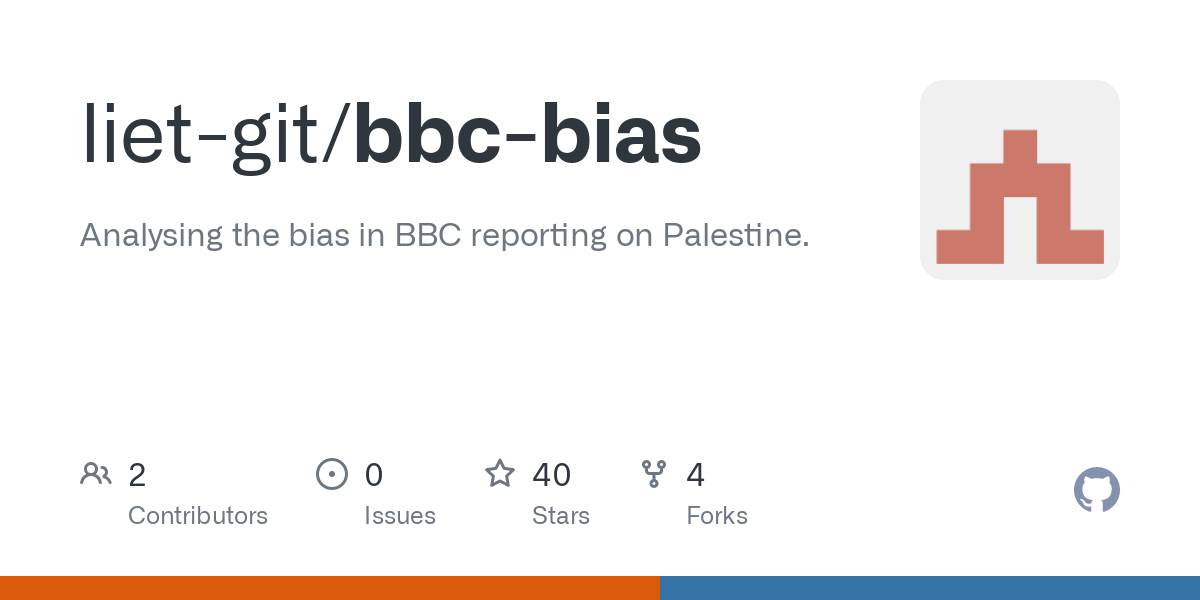Overview
This work aims to shed light on bias in BBC reporting on Palestine in a way that is both transparent and reproducible. We analyzed a total of 600 articles and 4000 livefeed posts on the BBC website between October 7, 2023 and December 2, 2023 in an attempt to surface the systematic disparity in how Palestinian and Israeli deaths are treated in the media.
The pipeline of the study is as follows:
We obtained source articles and livefeed posts from the BBC website by selecting relevant topics (see below for full list) and
We parsed the individual sentences using the Stanford CoreNLP natural language processing
Using the results from step 2, we identified sentences with mentions of death and manually tagged each one of them as referring to Palestinians, Israelis, neither or both. None of the tagging was performed automatically.

I’m not seeing any mention of how they parsed out the data to account for reiteration of past reporting.
Let’s assume a different situation, one where Individual A slaps Individual B in a high school, and the incident is reported on in the schools newspaper. Initially, there is going to be a set of wording used: “B was the victim of an attack when A slapped them.”
You now have the first instance of “B was the victim” and “A slapped B”. Now let’s assume B slaps A the following day, resulting in a new newspaper story: “As we remember from yesterday, where B was the victim of a slapping by A. Today, B struck A.”
Now we have an instance of “B was the victim” and “A slapped B” but we have the first instance of “B struck A”. We’re two reports in, and using the methods described we have observed a bias.
Over the following days, similar retributive actions are carried out by both A and B. However, the root event doesn’t change. Each article is prefaced with something akin to “As we remember from previous days, where B was the victim of a slapping by A…” This doesn’t necessarily indicate bias, it can also be attributed to keeping the story grouped.
Is that what’s going on? I have no idea, and I’m not at all claiming that is the case. In fact, I don’t routinely pay attention to news from the BBC at all. But the lack of this being mentioned did make me wonder if it was factored in. That said, some of that language choice is obviously an issue. Especially “children” vs “people under 18”.
That said, if anyone sees something I missed in the github, I am more than happy to correct this comment to reflect my misunderstanding.
This is excellent work!
Seems like the analysis is starting from the hypothesis that the BBC is biased, while a better scientific inquiry is “IS the BBC biased”.
I fail to see your point. Whenever you have a theory you either have a suspicion of some severity that what you are testing against is the case. Depending on that severity your own process will be biased and being upfront about what you are trying to do is far better practice than trying to hide it by appearing more neutral than you actually are. If anything these researchers are doing everything correct, people can now go ahead and check their process for bias if the suspect so based on the findings, if they had presented themselves as a neutral party some would be more hesitant to do so since the researchers did not display any inherent bias.
It is perfectly fine to start from a biased perspective if you are open about that bias (which is the case here) and don’t try to argue against people if they show that your process was tainted by that bias (remains to be seen on two counts: was this researched biased and if so how would the researchers responds). But having a bias in itself is not inherently wrong, if it were none of modern science would pass that test.
Noooooooooo. No.
Everyone and every organization has a bias. Even a “neutral” bias is a bias. Finding out which way their bias leans is good info to figure out.
No?
Positing something and validating the theory through research is appropriate scientific inquiry.
It’s obvious to many people that the BBC had a bias, there was no need to ask the question when they could answer the question.
If you disagree, feel free to present a compelling study as to why you think so. That’s how the scientific method works.
They’re missing the classics!
Kids/children vs people under 18
Hostage vs prisoners
As in *The Israeli hostages are mostly women and children, the Palestinians prisoners are mostly women and people under 18", in both cases they’re people that have nothing to do with the conflict, in both cases some of them aren’t adults.
Or maybe it’s because the Israelis, Thais, French, etc., were kidnapped from their homes for the express purpose of wartime negotiation, i.e. hostages. The Palestinians are all held in connection with crimes, including convictions for violent crimes.
If anything, this has exposed major injustices in the Israeli criminal system, such as people being held for long periods of time without charges, unrealistically high conviction rates, etc.
However, let’s also not buy into the Hamas line that the two groups are equivalent. That’s just an attempt to whitewash their Oct 7 atrocities.
That’s not true. Israel routinely detains Palestinians including children without charge.
https://www.bbc.co.uk/news/world-middle-east-67600015
Thousands are held without charge and for indefinite periods:
*As of November 1, Israeli authorities held nearly 7,000 Palestinians from the occupied territory in detention for alleged security offenses, according to the Israeli human rights organization HaMoked. Far more Palestinians have been arrested since the October 7 attacks in Israel than have been released in the last week. Among those being held are dozens of women and scores of children.
The majority have never been convicted of a crime, including more than 2,000 of them being held in administrative detention, in which the Israeli military detains a person without charge or trial. Such detention can be renewed indefinitely based on secret information, which the detainee is not allowed to see. Administrative detainees are held on the presumption that they might commit an offense at some point in the future. Israeli authorities have held children, human rights defenders and Palestinian political activists, among others, in administrative detention, often for prolonged periods.*
That’s exactly what I said in my reply. Thanks for providing additional links.
You’re welcome.
This last of your comment is misleading as many of them are held for no reason at all.
The Palestinians are all held in connection with crimes, including convictions for violent crimes.
Also Palestinians are detained and processed by military courts so they do not benefit from civil rights that Israeli citizens enjoy








